
Keynote Speakers

|
Prof. Ronald Yager |
Presentation
More information to follow soon
Biography
Ronald R. Yager received his undergraduate degree from the City College of New York and his Ph. D. from the Polytechnic University of New York. He has served at the National Science Foundation as program director in the Information Sciences program. He was a NASA/Stanford visiting fellow as well as a research associate at the University of California, Berkeley. He has served as a lecturer at NATO Advanced Study Institutes. Currently, he is Director of the Machine Intelligence Institute and Professor of Information and Decision Technologies at Iona College. He is a fellow of the IEEE, the Fuzzy Systems Association and the New York Academy of Sciences. He is editor and chief of the International Journal of Intelligent Systems. He serves on the editorial board of a number of journals including Neural Networks, Data Mining and Knowledge Discovery, the Journal of Approximate Reasoning, IEEE Intelligent Systems, Fuzzy Sets and Systems and the IEEE Transactions on Fuzzy Systems. He is one of the co-founders of the conference on Information Processing and the Management of Uncertainty. He has published over 500 articles and fifteen books. In addition to his pioneering work in the area of fuzzy logic, his recent research has focused on problems arising in decision making under uncertainty, the fusion of information and E-Commerce.
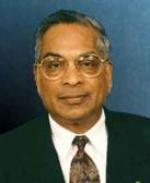
|
Dr. Madan M. Gupta, Director |
Presentation
More information to follow
Biography
Dr. Madan M. Gupta(publication list,book list,research compendium,faculty page,lab page) is a Professor (Emeritus) in the College of Engineering and the Director of the Intelligent Systems Research Laboratory at the University of Saskatchewan. Dr. Gupta?s current research interests are in the areas of neuro-vision systems, neuro-control systems, integration of fuzzy-neural systems, neuronal morphology of biological vision systems, intelligent and cognitive robotic systems, cognitive information, new paradigms in information processing, and chaos in neural systems. He is also developing some new architectures of computational neural networks and computational fuzzy neural networks for application to advanced robotics, aerospace, medical, industrial and business systems.
His interest also lies in signal and image processing with applications to medical systems.
Dr. Gupta received his B.E.(Hons.) and M.E. degrees in electronics-communications engineering from the BirlaEngineeringCollege (now the Birla Institute of Technology & Science), Pilani, India in 1961 and 1962, respectively. He received his Ph.D. degree from the University of Warwick, United Kingdom in 1967 in adaptive control systems. In the fall of 1998, for his extensive contributions in neuro-control, neuro-vision, and fuzzy-neural systems, Dr. Gupta was awarded an earned Doctor of Science (D.Sc.) degree by the University of Saskatchewan.
Dr. Gupta has authored or co-authored over 800 published research papers. He has recently co-authored the seminal book entitled ?Static and Dynamic Neural Networks: From Fundamentals to Advanced Theory?. Dr. Gupta has previously co-authored two other books: ?Introduction to Fuzzy Arithmetic: Theory and Applications? (the first book on fuzzy arithmetic),and ?Fuzzy Mathematical Models in Engineering and Management Science?. Both of these books have Japanese translations. Also, Dr. Gupta has edited or co-edited 19 other books, many conference proceedings and journals in the fields of his research interest such as adaptive control systems, fuzzy computing, neuro-computing, neuro-vision systems, and neuro-control systems (book list).
Dr. Gupta was elected fellow of the Institute of Electrical and Electronics Engineers (IEEE) for his contributions to the theory of fuzzy sets and adaptive control systems and for the advancement on the diagnosis of cardiovascular disease. He was elected fellow of the International Society for Optical Engineering (SPIE) for his contributions to the field of neuro-control and neuro-fuzzy systems. He was also elected fellow of the International Fuzzy Systems Association (IFSA) for his contributions to fuzzy-neural computing systems.
In 1998, Dr. Gupta was honored by the III- Kaufmann Prize and Gold Medal for his research in the field of fuzzy logic. This Gold Medal was presented by the Foundation FEGI (Fundació per a l'Estudi de la Gestió en la Incertesa: Fuzzy Management Research Foundation) and SIGEF (Sociedad Internacional de Gestión Economia: Fuzzy, International Association for Fuzzy Set Management and Economy) in Reus, Spain.
In 1991, Dr. Gupta was the co-recipient of the Institute of Electrical Engineering Kelvin Premium. He was elected as a visiting professor and a special advisor in the area of high technology to the European Centre for Peace and Development (ECPD), University for Peace, which was established by the United Nations. In 1991 he was invited by the ECPD to visit and lecture about five industrial and research centers in India.
Dr. Gupta is or has been on the editorial board of over fifteen journals in the field of fuzzy- neural and intelligent systems. Also, he has participated in the initiation of some of these journals. He has also served as a founding member of some of the international societies such as International Fuzzy Systems Association (IFSA), North American Fuzzy Information Processing Society (NAFIPS) and Canadian Fuzzy Information and Neural Society (CAN-FINS).
Invited Speakers
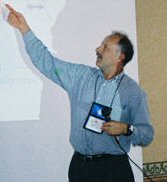
|
Johann Schumann |
Presentation
More information to follow
Biography
Dr. rer. nat. habil. Johann Schumann is a member of the Robust Software Engineering Group RSE at NASA Ames where he is involved in several projects on verification and deductive software synthesis. He obtained his habilitation degree (2000) from the Technische Universität München, Germany on application of automated theorem provers in Software Engineering. His PhD thesis (1991) was on high-performance parallel theorem provers. He is currently working on deductive synthesis of UML statecharts, of avionics-related software and of data-analysis programs from Bayesian nets. His research interests lie in the application of formal methods to improve design and reliability of safety- and security-critical software, and on the validation of adaptive systems (e.g., Neural Networks). He is author of a book on theorem proving in software engineering and numerous articles on automated deduction and its applications.
You can download his extended biography here.
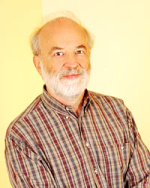
|
Prof. Peter Grogono |
Presentation
More information to follow
Biography
Peter Grogono received B.A. and M.A. degrees in mathematics from Cambridge University and M.Comp.Sc. and Ph.D. degrees in computer science from Concordia University. He is currently a professor in the Department of Computer Science and Software Engineering at Concordia University, where he has taught since 1979. He has published several text books and has received teaching awards from both the Faculty and the University. Before joining Concordia, Peter worked in several areas of the software industry, including pattern recognition, operating systems, electronic music, engineering, and accounting. His interests include artificial life, concurrent programming languages, and applications of computers to the arts. Peter is currently working on two exploratory projects: a workbench for experiments in artificial embryogeny and a programming language based on concurrent processes.
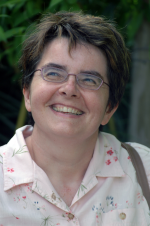
|
Prof. Brigitte Jumard |
Probabilistic Reasoning in Connection with Modeling and Simulation
More info to follow
Biography
Brigitte Jaumard holds a Concordia University Research Chair, Tier 1, on the Optimization of Communication Networks in the CIISE – Concordia Institute for Information Systems and Engineering – Institute at Concordia University. She was previously awarded a Canada Research Chair – Tier 1 – in the Department of Computer Science and Operations Research at Université de Montréal. She is an active researcher in combinatorial optimization and mathematical programming, with a focus on applications in telecommunications and artificial intelligence. Recent contributions include the development of efficient methods for solving large-scale mathematical programs, and their applications to the design and the management of optical, wireless and 3G/4G networks. In Artificial Intelligence, contributions include the development of efficient optimization algorithms for probabilistic logic (reasoning under uncertainty) and for automated mechanical design. B. Jaumard has published over 150 papers in international journals in Operations Research and in Telecommunications.
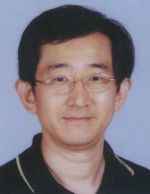
|
Dr. JingTao Yao University of Regina 3737 Wascana Parkway, Regina, Saskatchewan, Canada S4S 0A2  Tel: +1-(306)-585 4071 Tel: +1-(306)-585 4071 Fax: +1-(306)-585 4745 Fax: +1-(306)-585 4745 Email: jtyao@cs.uregina.ca Email: jtyao@cs.uregina.ca
|
Granular Computing: A new paradigm in information processing
Granular computing (GrC) has emerged as one of the fastest growing information processing paradigm in computational intelligence and human centric systems. It has been gaining popular in the past ten years. GrC is often defined as an umbrella term to cover any theories, methodologies, techniques, and tools that make use of granules in complex problem solving. In fact, as a new term for the problem solving it may be viewed
more on a philosophical rather than technical level. In this talk, I will give a brief introduction to granular computing and discuss its present developments and research directions.
Biography
Dr. JingTao Yao is an Associate Professor of Computer Science at the University of Regina. Before arriving Canada, he taught at Massey University, New Zealand, the National University of Singapore, Singapore, and Xi'an Jiaotong University, China. He received his Ph.D. degree at the National University of Singapore and did a B.Eng. degree and an M.Sc. degree at Xi'an Jiaotong University. His research interests include soft computing, data mining, forecasting, neural networks, computational finance, electronic commerce, Web intelligence and Web-based support systems. He has published more than 70 papers in these areas. Dr. Yao served and is serving as program, conference, and workshop chair as well as program committee member of many international conferences.











